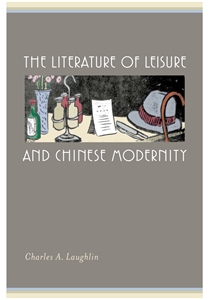The Literature of Leisure and Chinese Modernity
On Sale!- About the Book
-
The Chinese essay is arguably China’s most distinctive contribution to modern world literature, and the period of its greatest influence and popularity—the mid-1930s—is the central concern of this book. What Charles Laughlin terms “the literature of leisure” is a modern literary response to the cultural past that manifests itself most conspicuously in the form of short, informal essay writing (xiaopin wen). Laughlin examines the essay both as a widely practiced and influential genre of literary expression and as an important counter-discourse to the revolutionary tradition of New Literature (especially realistic fiction), often viewed as the dominant mode of literature at the time.
After articulating the relationship between the premodern traditions of leisure literature and the modern essay, Laughlin treats the various essay styles representing different groups of writers. Each is characterized according to a single defining activity: “wandering” in the case of the Yu si (Threads of Conversation) group surrounding Lu Xun and Zhou Zuoren; “learning” with the White Horse Lake group of Zhejiang schoolteachers like Feng Zikai and Xia Mianzun; “enjoying” in the case of Lin Yutang’s Analects group; “dreaming” with the Beijing school. The concluding chapter outlines the impact of leisure literature on Chinese culture up to the present day.
The Literature of Leisure and Chinese Modernity dramatizes the vast importance and unique nature of creative nonfiction prose writing in modern China. It will be eagerly read by those with an interest in twentieth-century Chinese literature, modern China, and East Asian or world literatures.
- About the Author(s)
-
Charles A. Laughlin, Author
- Reviews and Endorsements
-
- More than any scholar in the field, Charles Laughlin has placed the prose essay at the heart of modern Chinese literary production and reception—where it rightly belongs. As a whole, his work demonstrates both the variety of approaches modern Chinese writers have taken to the prose genre and the essential interconnectedness of political literature and the literature of leisure. With this volume, the field seems to have matured to the point that we no longer need to obsess about ‘alternative modernities’ as counterweights to the ‘hegemony’ of the May Fourth mainstream. Since xiaopin wen (little prose pieces) were explicitly associated with the prose writing of late imperial China, Laughlin’s book also shows us how the rigid dichotomy between tradition and modernity has been a false construct in the scholarship on modern Chinese literature. Finally, organized around schools of prose—Yusi, White Horse Lake, Analects, and Crescent Moon—the book contributes greatly to our understanding of prose’s critical place in the shaping of a Republican-era literary field. Important on so many levels, The Literature of Leisure and Chinese Modernity is a must-read.
—Kirk A. Denton - The essay is a uniquely Chinese modern literary genre, and Laughlin is the first to have made it fully accessible to English-language scholarship. In this book he provides a thorough and knowledgeable overview of the main ‘schools’ of essay writing in the 1920s and 1930s. His readings and analyses of the works truly open up the beauty and complexity of the genre to any reader interested in literature, and he frames his discussions in a consistent argument about what he calls a ‘literature of leisure’ that shows us a different and indispensable side of Chinese modernity.
—Michel Hockx
- More than any scholar in the field, Charles Laughlin has placed the prose essay at the heart of modern Chinese literary production and reception—where it rightly belongs. As a whole, his work demonstrates both the variety of approaches modern Chinese writers have taken to the prose genre and the essential interconnectedness of political literature and the literature of leisure. With this volume, the field seems to have matured to the point that we no longer need to obsess about ‘alternative modernities’ as counterweights to the ‘hegemony’ of the May Fourth mainstream. Since xiaopin wen (little prose pieces) were explicitly associated with the prose writing of late imperial China, Laughlin’s book also shows us how the rigid dichotomy between tradition and modernity has been a false construct in the scholarship on modern Chinese literature. Finally, organized around schools of prose—Yusi, White Horse Lake, Analects, and Crescent Moon—the book contributes greatly to our understanding of prose’s critical place in the shaping of a Republican-era literary field. Important on so many levels, The Literature of Leisure and Chinese Modernity is a must-read.
- Supporting Resources
-










